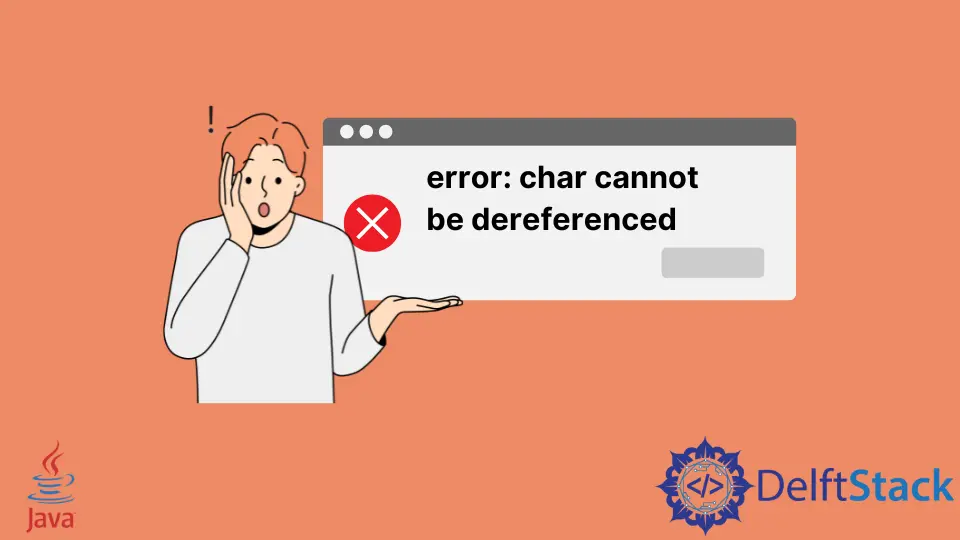How to Fixe Error: Java Char Cannot Be Dereferenced
-
Reasons for
Char Cannot Be DerefencedError -
Methods to Solve the
Char Cannot be DereferencedError - Conclusion

This tutorial demonstrates how to solve Java’s java char cannot be dereferenced error.
Reasons for Char Cannot Be Derefenced Error
The error char cannot be dereferenced occurs in Java when you attempt to invoke a method or access a field on a primitive char type as if it were an object. This happens because primitive types, including char, do not have methods or fields like objects.
Attempting to Call a Method on a char Primitive
Attempting to call a method on a char primitive in Java results in the char cannot be dereferenced error because primitive types lack the structure of objects. Unlike objects, primitives, including char, do not have associated methods or fields.
As a result, treating a char as an object and trying to invoke methods on it leads to this compilation error.
Using a Dot Notation on a char Primitive
Using dot notation on a char primitive results in the char cannot be dereferenced error in Java because primitive types lack the properties and methods associated with objects. Dot notation is used to access members of objects, and since char is a primitive, attempting to use dot notation implies treating it as an object, which is not valid for primitive types, leading to this compilation error.
Assuming char Is an Object
Assuming a char is an object results in the char cannot be dereferenced error in Java because, although autoboxing may convert it to a Character object, it remains a primitive. Attempting to access methods on this assumed object leads to the error, as primitives lack the structure of objects.
Trying to Access a Field on a char
Trying to access a field on a char results in the char cannot be dereferenced error in Java because primitive types, including char, lack fields or properties. Unlike objects, which can have associated fields, primitives do not support direct access to fields.
This attempt to access a field on a char as if it were an object leads to a compilation error.
Mixing Up char and String Operations
Mixing up char and String operations results in the char cannot be dereferenced error in Java because primitive char lacks the methods available for String objects. Trying to call String-specific methods on a char primitive confuses the compiler, leading to this compilation error.
Methods to Solve the Char Cannot be Dereferenced Error
Wrapper Class
Using a wrapper class like Character in Java allows treating primitive char values as objects, providing access to useful methods and resolving limitations associated with direct manipulation of primitive types. The use of wrapper classes provides a convenient solution without sacrificing the efficiency of primitive types.
Code Example:
public class CharDereferenceExample {
public static void main(String[] args) {
char myChar = 'A';
// Using Character wrapper class to overcome "char cannot be dereferenced" error
Character charWrapper = Character.valueOf(myChar);
// Call methods on the Character wrapper
char convertedChar = charWrapper.charValue();
System.out.println("Original char: " + myChar);
System.out.println("Converted char: " + convertedChar);
}
}
In this code breakdown, we first declare a primitive char variable, myChar, initializing it with the character A. To overcome the char cannot be dereferenced error, we then create an instance of the Character wrapper class using the valueOf method, where the primitive char myChar is passed as an argument.
With the resulting Character object (charWrapper), we proceed to dereference it by calling the charValue() method, allowing us to retrieve the underlying char value. Finally, we print both the original char value (myChar) and the converted char value (convertedChar) to the console, resolving the dereferencing error using the Character wrapper class.
Output:

The output demonstrates that we successfully converted and dereferenced the char value using the Character wrapper class, resolving the initial issue.
String Conversion
String conversion in Java transforms primitive char values into strings, enabling seamless access to string methods and overcoming restrictions associated with direct manipulation of primitive types. This method provides an alternative solution to the use of wrapper classes, offering flexibility in handling character data.
Code Example:
public class CharToStringExample {
public static void main(String[] args) {
char myChar = 'B';
// Convert char to String to overcome "char cannot be dereferenced" error
String charAsString = String.valueOf(myChar);
// Call methods on the String representation of the char
int charLength = charAsString.length();
char charAtZero = charAsString.charAt(0);
System.out.println("Original char: " + myChar);
System.out.println("String representation: " + charAsString);
System.out.println("Length of the string: " + charLength);
System.out.println("Character at index 0: " + charAtZero);
}
}
In this code explanation, we begin by declaring and initializing a primitive char variable, myChar, set to the character B. To address the char cannot be dereferenced error, we then convert the primitive char to a String using the valueOf method from the String class, which takes the char as input and returns its string representation.
Subsequently, with the obtained String representation (charAsString), we treat it as an object and invoke methods on it, utilizing length() to retrieve the string length and charAt(0) to obtain the character at index 0. Finally, we print the original char value, the string representation, the string length, and the character at index 0 to the console.
Output:

The output illustrates that we successfully converted the char to a String and performed operations on it without encountering the dereferencing error.
Direct Comparison Method
By comparing primitive char values directly, developers avoid the need for complex conversions or wrapper classes, ensuring a straightforward and efficient solution to the dereferencing issue.
Directly comparing primitive char values provides a simple and effective solution to the char cannot be dereferenced error. By bypassing the need for wrapper classes or conversions, this method allows developers to perform comparisons and boolean operations directly on the primitive data type, maintaining code clarity and efficiency.
Code Example:
public class CharComparisonExample {
public static void main(String[] args) {
char firstChar = 'C';
char secondChar = 'C';
// Directly compare chars to overcome "char cannot be dereferenced" error
boolean areCharsEqual = (firstChar == secondChar);
System.out.println("First char: " + firstChar);
System.out.println("Second char: " + secondChar);
System.out.println("Are chars equal? " + areCharsEqual);
}
}
In examining this code, we start by declaring and initializing two primitive char variables, namely firstChar and secondChar, both set to the character C. To address the char cannot be dereferenced error, we directly compare these two char values using the equality operator (==).
The comparison assesses whether the characters are equal, and the result is stored in the boolean variable areCharsEqual. Subsequently, we print the original values of firstChar and secondChar, along with the outcome of the direct comparison, to the console.
Output:

The output demonstrates that the direct comparison of firstChar and secondChar using the equality operator successfully overcomes the dereferencing error, indicating that the two characters are indeed equal.
Conclusion
Understanding the char cannot be dereferenced error is crucial for Java developers. By exploring methods such as using wrapper classes, string conversion, and direct comparison, we have versatile tools to address this issue efficiently.
Whether choosing the simplicity of direct comparisons, leveraging the functionality of wrapper classes, or employing string conversion, developers can navigate and resolve the challenge, ensuring smooth and error-free handling of primitive char types in Java.
Sheeraz is a Doctorate fellow in Computer Science at Northwestern Polytechnical University, Xian, China. He has 7 years of Software Development experience in AI, Web, Database, and Desktop technologies. He writes tutorials in Java, PHP, Python, GoLang, R, etc., to help beginners learn the field of Computer Science.
LinkedIn FacebookRelated Article - Java Error
- How to Fix the Error: Failed to Create the Java Virtual Machine
- How to Fix the Missing Server JVM Error in Java
- How to Fix the 'No Java Virtual Machine Was Found' Error in Eclipse
- How to Fix Javax.Net.SSL.SSLHandShakeException: Remote Host Closed Connection During Handshake
- How to Fix the Error: Failed to Create the Java Virtual Machine
- How to Fix Java.Lang.VerifyError: Bad Type on Operand Stack
